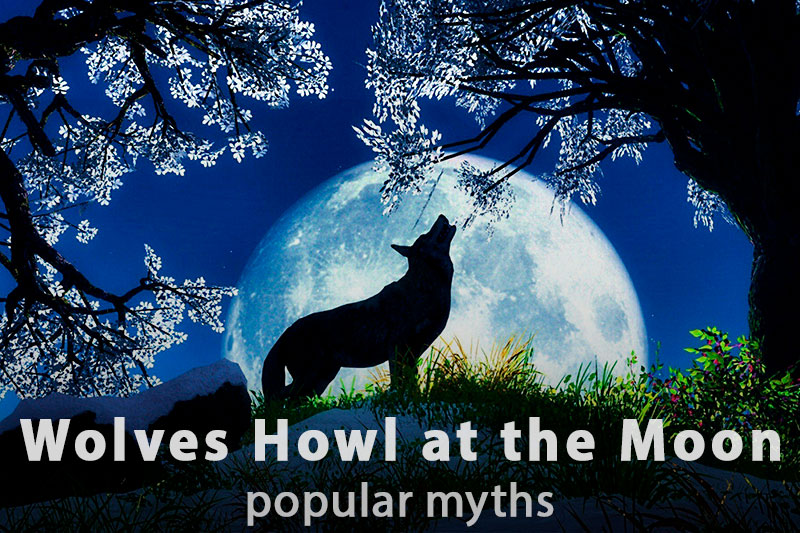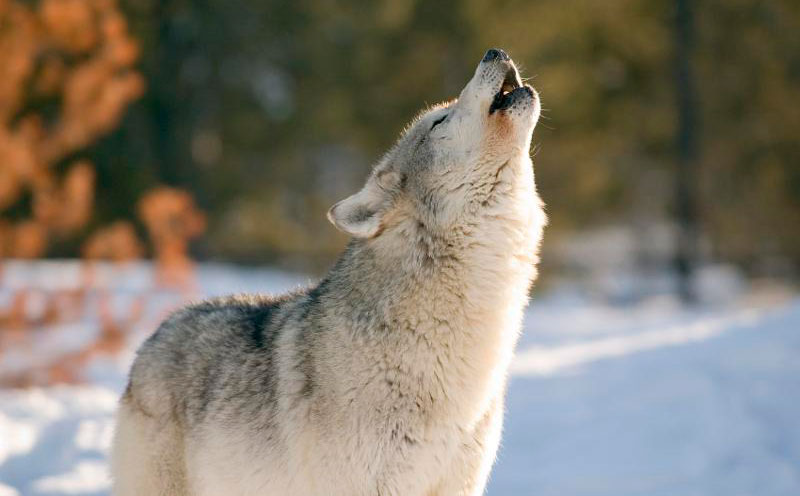Everybody learns this fact in their mother's lap, but still, many people wonder why wolves do so. Today we will try to answer this, and other related questions—from “Why do wolves howl?” to “What are other sounds they are able to produce?”. In our research, we use only proven and reliable sources.

Turns out it’s not about the moon—the moon may hide behind clouds or be out of sight during the new moon.
Howling is basically a way of communicating in a pack or with lone wolves.
There are plenty of them—wolves are way ahead of other animals by the diversity of vocal characteristics.
By and large, the reason is the same as why people talk. That's it! Howling simply allows wolves to communicate with each other and maintain social bonds. They can howl both alone and in groups. And group howling, by the way, gives a more ominous and mind-bending impression. Pack leaders start the song—their howl pitch differs from those of other members. Then the other wolves join it one by one.
Group howling serves several purposes. The most important is an emotional one —communication strengthens the sense of togetherness and belongingness. It also helps a pack to mark the territory and protect it fiercely from strangers. After all, a group howling can communicate each wolf's whereabouts if a pack straggles out over a large area (wolves usually unite only to hunt or in the hungry wintertime). Having sharp ears, wolves can easily get a fix on the location.
History is teeming with examples of people listening to a howl and understanding wolves’ conversations. A book written by Canadian writer and biologist Farley Mowat is an example of this, telling about an Eskimo named Utek who possessed this rare skill.
Well, the moon thing is no doubt a myth. Wolves howl — they really do and do it a lot. But it has nothing to do with the moon! With the above in mind, howling for wolves, especially group howling, primarily plays a social part in their life. Where did such a strange malarkey come from? That's an interesting question, which we need to do a deep dive into.
To begin with, wolves tend to howl at night. There are several grounds for this. Firstly, wolves are nocturnal animals. It makes no sense for them to wake up during the day just to howl. The second thing is that the sound is carried much farther at night, given the silence all around. This helps a wolf track the precise location of the rest pack.
Whether standing or sitting, wolves always point their snouts toward the sky to howl. That's why it does look like an animal is staring at the moon. But they really do this to carry the howl better across the area. As you know—the higher a source is, the fewer barriers a sound will hit.
What a random hunter or tourist would think when they saw a headed-to-the-sky wolf and heard a spine-chilling howling in the dead of night? He is definitely howling at the moon!
What gave a clue that it's not the Earth's satellite wolves are howling at? The answer is quite simple: howling time is not limited to the full moon—wolves howl at the new moon and on cloudy days as well, when it’s impossible to track the satellite from the Earth. So, its presence in the sky is completely irrelevant. The thing is, a wolf is even harder to distinguish when it's dark, especially if he's far away from you. Eventually, many such cases took place on cloudless nights with the full moon.
Few are aware that wolves are those animals that boast a huge set of different vocal expressions. In this connection, they are second to only humans and some species of chiropterans (bats and their closest relatives).
These graceful gray predators can howl, growl, whimper, bark, groan and yell. Moreover, they combine those sounds in numerous variations, which can drastically change the meaning of a "speech."
For communicating at night or chasing the prey and coordinating each other's location, wolves prefer to howl or wail. As we said earlier, it's a leader who starts howling at night, while the rest pack gradually joins in with the "conversation." However, this does not end up with an elegant and direly howling, but is a kind of barking with slight yelling. When wolves are close to each other, they opt for groaning or barking to send friendly or warning messages. But when a wolf attacks a pack member, a human, or prey, a normal sound will be something close to growling, which is typical of an angry dog.
References: Links and sources